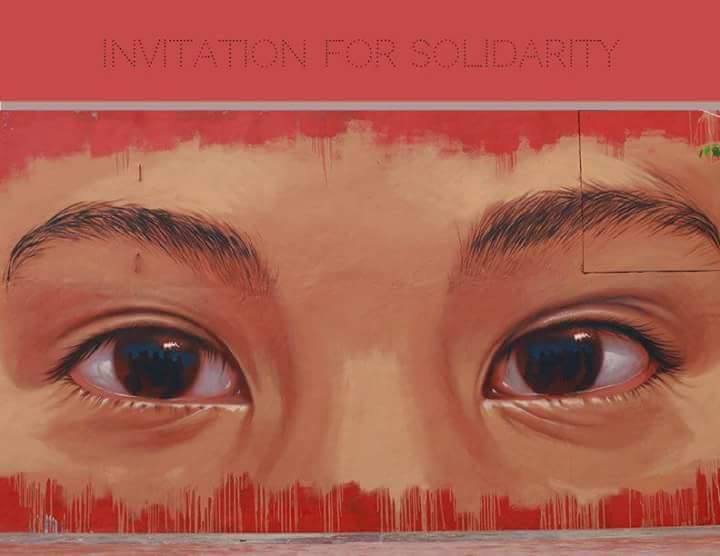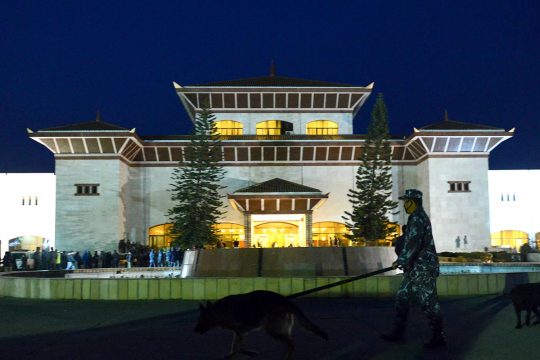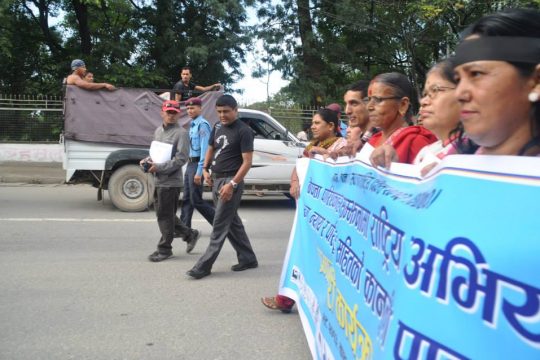Every year, as part of the global movement against enforced disappearances, we commemorate the International Day Against Enforced Disappearance. On this day, we, raise up the voices of families affected by enforced disappearance, express solidarity with the struggle for justice worldwide, and remember our beloved family members who were forcibly taken away from their communities and never seen again.
From 1996-2006, Nepal endured a civil war in which hundreds of citizens were forcibly disappeared by state forces and the Maoist rebels. It is a human tragedy to live in a state of ambiguity. When my father was forcibly detained and disappeared in 2001, never to be heard from again, my family tragedy destroyed my whole universe. Like myself, thousand of families miss their relatives and remember them everyday as the search continues. “I remember my son every moment and every day. He is near and never forget; it is not only an absence of my son but a right to life and right to know of his forced disappearance,” says Motimaya, a mother whose son was forcibly disappeared. Every family, community and the nation remember the disappeared relatives. Each family member suffers everyday and the state is not listening to their voices.
How long the families must wait
Nepal’s Comprehensive Peace Agreement (CPA) in 2006 declared searching for the disappeared and addressing the needs of their surviving families as a national political commitment, but has failed to fulfill the commitment.
Families are left with a series of unending questions: Why has the state failed to address the families’ demands for truth and justice? Can Nepal address the structural violence committed during the war, that was systematic and planned, by the state security forces? Why does the state repeatedly fail to deliver justice and punish the perpetrators? Can Nepal commit to not repeating the cycle of disappearance? Why has it failed to criminalize enforced disappearance as a crime against humanity? Why did innocent citizens and political activists disappear and never come back? Why is the state unable to say whether they are ‘dead’ or ‘alive’? How long must families should wait for the answer?
My own question is: why did my father and many innocent people disappear without the state providing the truth about what happened exactly to him and many others. The answer to this question, official acknowledgement of the incident and a commitment to address the livelihood and security needs of conflict survivors are very important to me and to every family. These questions are raised by the families of the disappeared everyday and must be addressed immediately.
The Disappeared Commission
Can the Commission of Investigation on Enforced Disappeared Persons (CIEDP) answer the above questions? Without answering these questions for the families, the commission will be a failure in our history and must be held accountable for their abuse of resources in the cost of human loss and let the thousands of families wait for nothing for so long. It’s a big a tragedy against the human dignity and additional pain for our life and history.
The CIEDP seems to be a weak mechanism that serves a political interest without the political will to address the family’s agenda for truth and justice. Additionally, the commission’s level of competency, independency and willingness to solve the agenda has been lost due to their delayed response and unwillingness to act for the truth and justice. It’s process has been too slow and passive not only due to the lack of resources or the limitations of it’s mandate, but because of the government’s tactic of hiding the truth to protect the culprits. The senior army and police officers those who were directly involved in the disappearances still serve in the same positions.
Both institutions and the government rewarded the culprits and claim that none of the commissions can investigate them or question their past. The current primeminister Sher Bahadur Deuba defends the security forces and openly said in a recent programme that “Security Institutions will not be investigated and punished for the cause of their involvement during the war.” The majority of disappearances occurred during his political leadership of the war as prime minister. There is a long list of alleged perpetrators in political appointments, in the security forces, who are using state resources to sabotage the voices of the disappeared families. The surviving families do not feel secure in a current situation of state denial where the all perpetrators are united and their past abuses are defended. The CIEDP has so far documented violations but without a disappearance law at place, cannot investigate fairly to recommend for prosecution. The penetration of alleged perpetrators and their direct influence on the commission has added serious threat to the protection of the available evidences and files of the disappeared.
In two and a half years, the commission has not shown its performance on fair investigation and victim-centered approach. As all of the commissioners were appointed by the political parties as ‘their’ loyal agents to serve them, not to the families.
A staff at the CIEDP Nisedh Sharma (name changed) says “the commissioners are close ally of their respective political parties, they not only pass the information, but also intervene the fair process inside the commission, they are politically guided – and loyal to their political agenda.” Likewise – the Commissioner (don’t wish to disclose the name) says “the security forces (both army and the police) have penetrated their agents through government staff, its highly challenging to the commission to mobilize them for fair investigation and keeping the confidential cases.”
These facts are alarming and shows that both the commissioners and the government staff blame each other and serve an interest in destroying the commission’s credibility. Some of the government attorneys who are involved in the so-called investigation under Truth and Reconciliation Commission (TRC) and CIEDP – were part of conflicting cases during the war –advocated on behalf of the state against the non-state actors, the rebellion Maoists. The process of statement taken from the families has been reflected in the preliminary interview with families which seems very biased and, to weak if the desired end is a political reconciliation. Ramesh BK (name changed) said “the investigator came and interviewed me for less than ten minutes; I was highly disappointed that without detailed discussion, they asked me “Can you pardon” the perpetrators, it seems that the process is fully preparing ground for a fake reconciliation.”
The commissions do not have a serious plan to address families’ security, livelihood and memorialization concerns. A frontline family activist Bhagiram Chaudhary says, “The process is politically controlled, now I have a little hope that we will get justice within the perpetrators’ state, this is not only a political betrayal but also a big insult to the families’ demand for truth. The current mechanism not only failed to listen our everyday issues, but may create unwanted culture of revenge and chaos for the future.”
Government and the concerned agencies must listen the families demand for truth –“the right to know” and the serious episode of enforced disappearances of painful past must be resolved with a guarantee of non-repetition that nobody will face such situation in the future or deprive from ‘the right to life’.





